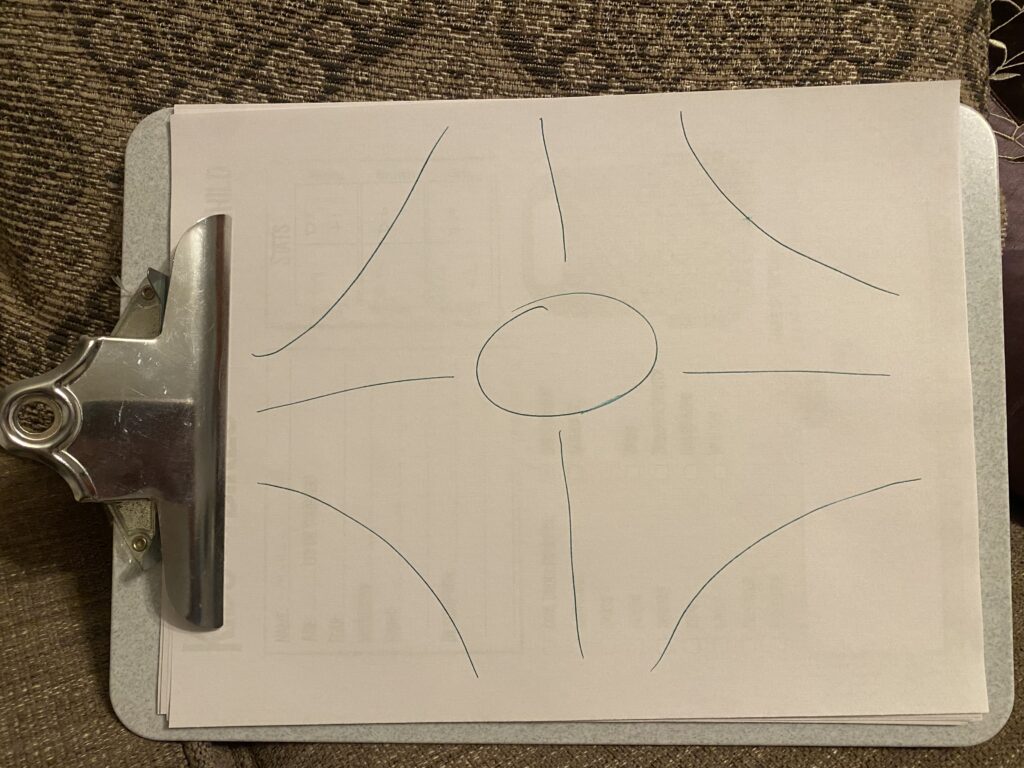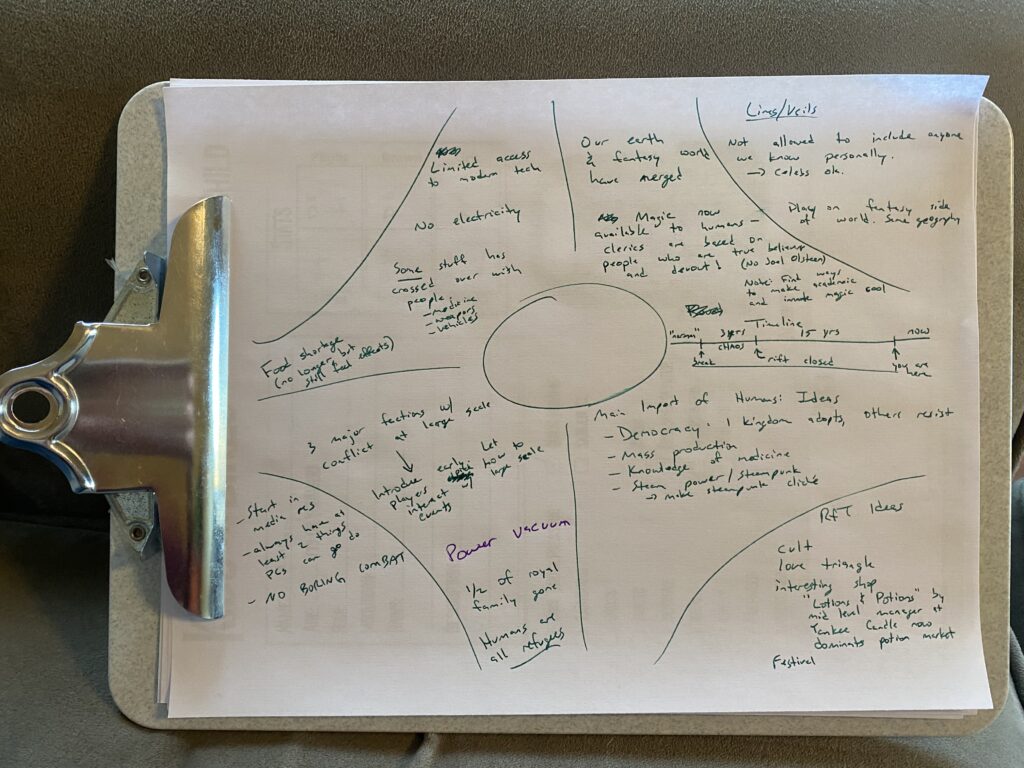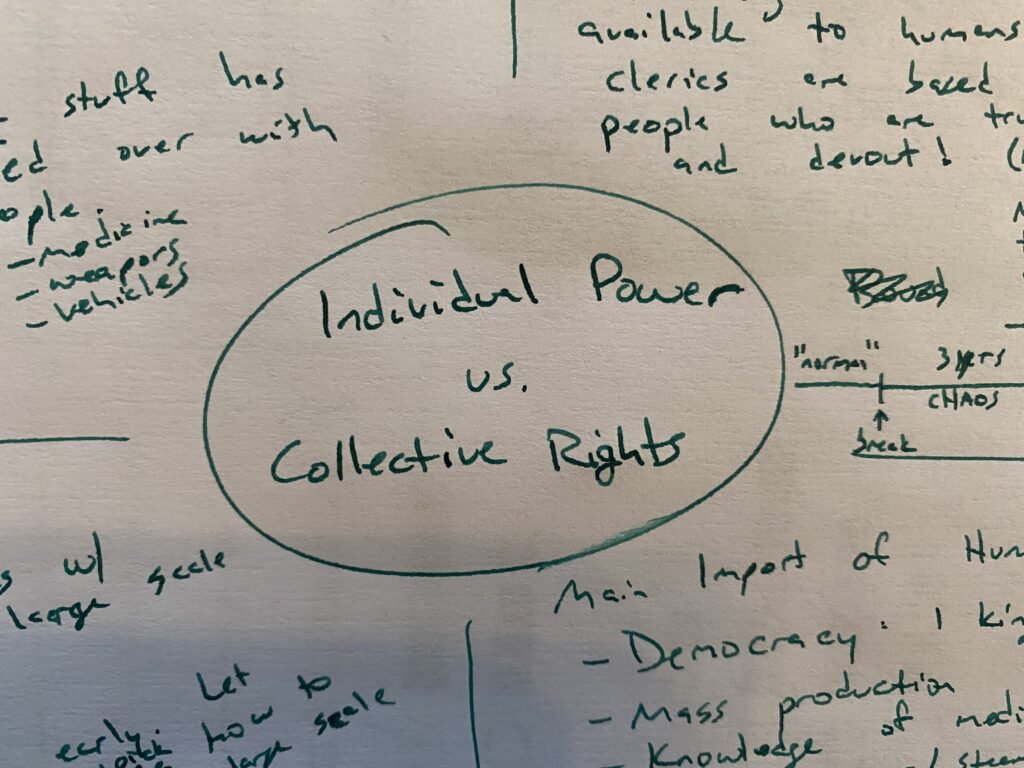You’ve decided to write an epic campaign for your tabletop role playing game from scratch. Awesome! But how do you do that? In this series I’ll chronicle my approach to designing and writing a long campaign as I’m doing it. Today’s topic in the series: your theme.
Brainstorming
If you’ve decided to run a long campaign, I’m assuming you’ve probably run some smaller campaigns or prewritten adventures. My guess is that you have a few ideas of things you want to have or avoid in your next game.
The first thing I’m going to do is just brainstorm around the things I want. I think the key to this part is to not try to organize it at all. There’s a time where I will use restriction to breed creativity, but right now I just want to put out all of the stuff I want.
There’s nothing here particular to building a TTRPG campaign (yet). This is standard brainstorming approaches. If you have a method you like and want to skip how I brainstorm, you can jump to the section The Kernel.
Step 1: Pen and Paper
Get out a piece of paper. No, seriously, paper. Don’t open a text editor or spreadsheet or anything like that. We want chaos. The reason for this is anchoring.

Here’s the problem with anchoring: Once we start brainstorming we’re going to start auto-categorizing ourselves. For example, if I start my brainstorming like this:
- Include a dragon
- Globetrotting
- Meet the BBEG right away
I look at this list and as I start adding to it, I’m already going to start building a narrative. In fact, from these three I’m already starting to think about how they are going to start in a small tavern where we introduce the BBEG and now I now need to tie that to an adventure to interact with the dragon.
The problem is once I see that list, I’m going to start adding things that fit into the list. If I have a concept that doesn’t quite fit, I’ll struggle to re-frame it so it “fits.” I might lose the concept. I want to avoid making everything fit right now.
Example: one of the things I want to add to my campaign is the idea of always giving my players 2 clear directions they can move next. (Side note: This is based on feedback from my players that they didn’t enjoy when they didn’t have direction.) I would probably start building an idea around two directions they could go from the initial starting point, but that doesn’t capture the idea that I want this to be a recurring point of my campaign. I will lose sight of it half way through the adventure.

This is what I’m using to start my campaign planning. Before I put down any ideas, I want to mess up my paper. The reason is simple: to help prevent writer’s block. An empty page can be intimidating. Also I make up a bunch of different sections because now I have given myself permission to add stuff that doesn’t fit with anything else I’ve put in.
Step 2: Brainstorming
First up, throw down all the ideas you have. Just write them down and move on. There’s no need to organize or make detailed plans yet. Even if you don’t intend to use it, write it down if it’s taking up your head space.
Put it anywhere on that paper. Let chaos reign.

I find that I never know when inspiration will hit. In this phase, I might fold that paper up and put it in my pocket so I can scratch something down when it comes to me. Other times I’ve texted myself a quick note.

Here’s what I’ve ended up with. I didn’t use all of the paper and that’s okay. I left the center part blank on purpose because I did want to use that for my central theme.
As I was doing this, adding in some parts I was already thinking about how I could link them together. Others were stand alone ideas. Some notes might not make sense to someone else, and that’s okay too.
A few of these I put just a few words. That’s okay for now, but if I set this down for any more than a couple of days I might forget what I mean by that. For example the part “power vacuum” specifically means that the loss of large parts of the high society will lead to a power vacuum. I might or might not be able to piece that together later. Adding a few words or arrows might be helpful.
Step 3: Walk Away
This is the easiest and hardest part of doing this. You want to give yourself time to let your brain relax. You’ll continue to process the parts you’ve written down. Maybe you’ll have inspiration while standing in line at the grocery story or while you’re in the shower. Give yourself time to let the ideas simmer.
Something comes up? Cool. Jot it down and walk away.
Give yourself a few days. Then you want to pick up where you left off and look at it fresh. Does it still make sense? Why or why not? What are you still very excited about? There may already be some ideas on there that you don’t remember what you originally meant by your note. Add some more notes or draw some lines connecting the ideas.
The Kernel
noun: the central or most important part of something.
Merriam-Webster
Step 4: Finding Your Theme
Now read all of the notes you’ve given yourself. Ask yourself if there’s some commonality between them or something you’re really focused on or interested in. Can you break that down to something simpler, something that’s less than even a full sentence?
If you have multiple ideas that don’t seem to have a direct connection, do they have some kind of common feel to them?
This is your theme!
Here’s how it worked for me. I have a few ideas that I’m really interested in:
- There was a huge power vacuum.
- Humans brought in all kinds of ideas to this world. One that was hugely disruptive was the concept of democracy.
- We have three neighboring kingdoms. One openly embraced democracy. One took a militant approach to maintain control. One is somewhere in the middle, mostly held up by economic control. This is a source of friction within each kingdom and across kingdoms.
- I like this idea a lot. Even though the rest of my ideas don’t necessarily connect to it, I’ll find ways to incorporate them. The real idea is that we have democracy going up against monarchy. But it’s not really about a monarchy per se, but rather power in the hands of a small number of people.
- To make this as pithy as possible, my theme is individual power vs collective rights.

Now that I have this, I can use it as a kernel to develop the rest of my ideas. For example, I have this one really fun idea about someone who was a middle level manager of a Yankee Candle who is now stuck in this magical fantasy world.
At first glance, this doesn’t really fit the theme. But I have a kernel that tells me I want to build scenarios using individual power vs collective rights. So I take this person and I’ll put them on the side of individual power. Lets say they were actually a really good manager and they understood how the entire Yankee Candle company worked and what made them successful – things like well established supply lines, making sure every store had the same experience when you walked in, and giving consistent quality with products that are easily recognizable.
Incorporating the theme
How can that possibly fit?
Ok, this person takes everything they know about running those stores and applies it to their new living situation. They start a company where they sell something magical (after all, we want this to be a fantasy story so it must be fantastic). My first thought was something about spells, but then I thought potions fit the idea of the storefront that comes to mind.
So I’m going to make this person ridiculously successful to the point where they have completely dominated the market for making potions. They can make all of the standard potions cheaper, more potent, and more easily available to the market. Local apothecaries are going out of business or changing their entire inventory because they can’t keep up. This person has created a monopoly – individual power over the collective rights of the rest of the people.
And how can I possibly pull this into my story? She’ll be an early quest giver and a really nice patron. Then I’ll expose to my players over time the down side of her empire and how it’s impacting the local economy.
Step 5: Review Your Ideas
This isn’t part of developing the theme itself, but it’s a good idea to go back and review your other ideas. Are there some where you can easily pull the theme in? They don’t all have to fit, but the more you can revisit the same concepts the more likely your players will pick up on it.
Draw lines between different ideas that you can link up. Reuse one idea in many places. Go wild!
Closing Thoughts
I’m not sure how well I’m going to keep up on this blog, but I’m doing it as I go. I’m really enjoying this world that I’m building. I hope someone finds my methods useful.
